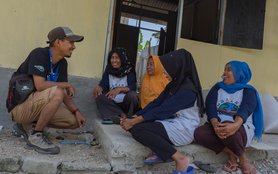Abbas Kigozi, Robert Hakiza, and JeanPaul Kasika on priorities of refugees in Ethiopia, Uganda, Kenya, South Africa, Nigeria, and Malawi that need to be heard at this week’s gathering in Geneva – including access to basic services, secure legal status and protection against forced returns.
This post was originally published on Views & Voices.
As the Global Refugee Forum gets underway, it needs to be guided by the voices and priorities of refugees themselves. This will be essential as those attending look to translate the Global Refugee Compact into reality.
The proper inclusion of refugee voices is crucial given the forum’s status as a pivotal platform for global refugee policies. Gathering together member states and stakeholders, it serves as a crucial arena for announcing tangible pledges and contributions, and driving international collaboration to address challenges faced by displaced communities. The pledges cover financial, technical, and policy commitments from governments, organisations, and private donors. It also acts as an important collaborative space for diverse stakeholders to find solutions.
As part of broader efforts around the forum to drive inclusivity and authentic representation, this blog shares priorities voiced by refugees from Ethiopia, Uganda, Kenya, South Africa, Nigeria, and Malawi in consultations and surveys.
KEY PRIORITIES FOR REFUGEES
Three issues emerge as particularly pressing from consultations and survey findings shed across Uganda, Kenya, South Africa, Nigeria, and Malawi:
- Access to basic services, such as education; services to support physical safety and protection; humanitarian assistance; health services; quality, safe and adequate shelter; and water and sanitation. Such access was recognized as significant by participants from all the countries surveyed, underscoring its importance for both refugee and host communities across Africa.
- Legal status and access to legal rights, including recognition of legal status; access to relevant documentation, the ability to claim asylum in the country of residence, access to adequate, safe, and dignified reception conditions; access to birth registration and relevant documentation; and access to legal services and protection.
- Access to durable solutions. This encompasses protection against involuntary or forced return, or refoulement; the ability to cross international borders to seek safety; and addressing the root causes of displacement.
Other primary policy concerns revolve around ensuring unrestricted mobility for refugees within the country and across borders, as well as addressing and enhancing access to employment opportunities for this vulnerable population.
WHAT CAN BE DONE TO ADDRESS THESE PRIORITIES?
We would identify 10 key areas for action to deliver on the above priorities.
- Policy reforms and financial support for refugee inclusion and integration, naturalisation, reinforcing international cooperation and equitable burden-sharing.
- Promoting inclusion and empowerment in policy formulation, decision-making spaces where refugees can have a chance to challenge the laws/ policies that affect them, and capacity building.
- Giving value to refugee documentation, and supporting refugee-led networks to raise awareness on document processes.
- Providing long-term targeted funding for refugees withdisabilities and people with a displaced background; improving support and accommodation for refugees with mental illness or mental disabilities.
- Raising public awareness through workshops, community forums, advocacy, campaigns, and social media; involving refugees in educating communities about displacement; and building awareness about refugee issues to garner public support.
- Ensuring governments implement relevant international instruments and refugee acts and policies. Ensure governments are accountable for refugee action.
- Advocating for legal reforms that protect refugee rights, promoting pro bono legal services and training on refugee issues.
- Addressing the root causes of displacement through conflict resolution; advocating for policies and practices that prevent conflict and promote peace,
- Engaging in diplomatic efforts through advocacy to build consensus on refugee issues, advocating for refugee rights.
- Fostering community engagement and coordination in programme and policy design; and promoting local partnerships with refugee-led organizations and community–based organisations. This not only promotes inclusivity but also enables the localisation of certain programmes, recognising the capacity and capability of refugee-led organizations to deliver refugee programming.



